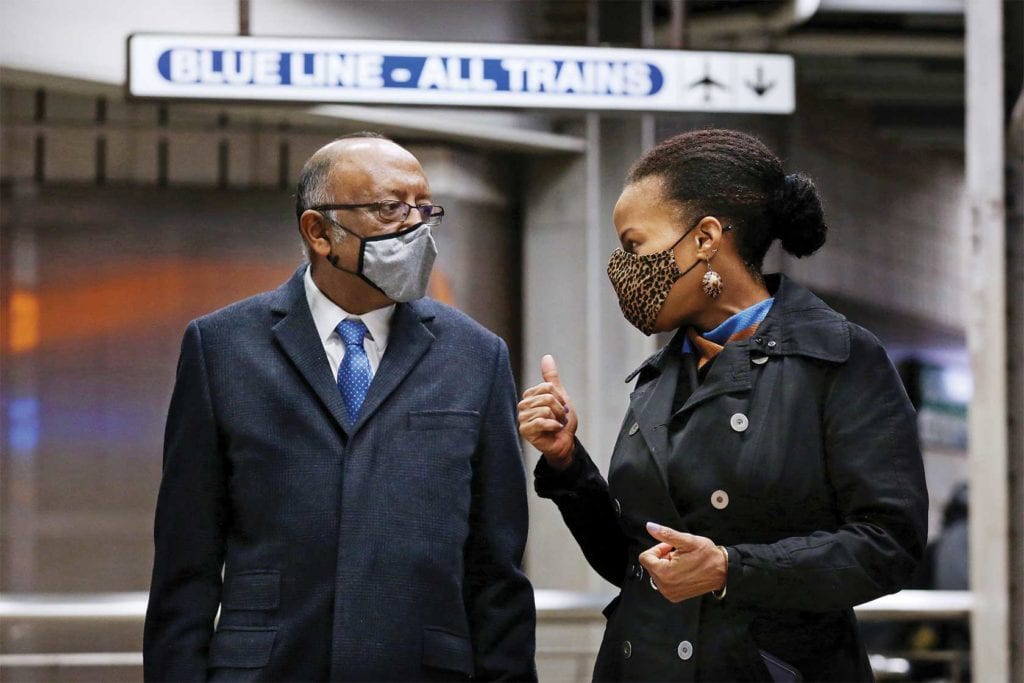Transit group presses MBTA to reverse cuts
Janey joins call for restoring service

Acting Mayor Kim Janey on Monday joined a coalition of public transit activists Monday in calling on the MBTA board to reverse service cuts on train and bus routes, cuts they say are hampering the ability of workers to get to and from their jobs and slowing the region’s path to economic recovery.
“We count on essential workers to get us through this pandemic, and essential workers count on public transportation,” Janey said at the news conference in Park Square, near the state transportation offices. “MBTA service cuts shortchange the needs of Boston’s workers and ignore the sacrifices they make each day to keep our city running.”
The MBTA drew fire earlier in March for service reductions to the Red, Orange and Green lines, as well as reductions in bus service and the elimination of some entire bus routes. The T also proposed layoffs but withdrew the proposal after coming under fire from members of the Massachusetts congressional delegation. While revenue is down at the MBTA, the agency has received $2 billion in federal stimulus funding, which elected officials and transit advocates say should be used to maintain pre-pandemic staffing and service levels.
“Service cuts make buses and trains more crowded, undermining our efforts to stop the spread of COVID-19,” Janey said. “We know that social distancing helps to keep us all safe.”
Olivia Nichols, an organizer with the environmental justice nonprofit GreenRoots, said the communities she organizes in East Boston and Chelsea have been particularly hard hit by transit service cuts.
“The folks of Chelsea and East Boston, many of whom are essential workers, have put their lives on the line, risking their health and the health of their families,” she said. “It is extremely concerning to see buses passing by that are full beyond capacity.”
During an MBTA Fiscal and Management Control Board hearing Monday, MBTA General Manager Steve Poftak said the agency is bringing back service as fast as it possibly can.
Janey called on the MBTA to publicly post a schedule of when services would be restored and to commit to restoring service in communities where cuts have been most severe and where COVID infection rates have been highest.
“Restoring public transportation is essential to our recovery, reopening and renewal as a city,” she said. “It will make Boston more fair and more equitable.”
Transit Is Essential, a coalition of 60 organizations statewide, is calling on Poftak to release a budget for the next fiscal year that reflects the restoration of services.
“We urge the MBTA and FMCB to formalize these steps in the FY22 budget that will be approved in April,” the group said in a statement. “The service cuts have set back our region — the need to restore service and build back better is now more urgent than ever.”
Brian Moy, a Chinatown restaurateur, said the food industry will suffer if MBTA service is not restored to pre-pandemic levels.
“We literally cannot reopen if our employees cannot come to us, if our customers cannot come to us during our normal business hours,” he said. “We will not be able to survive. Public transportation is essential for our survival here in Boston and all across the region.”
Janey, who became acting mayor last week, is not the only city official who has weighed in on MBTA service cuts. Former Mayor Martin Walsh and at-large Councilor Michelle Wu, who is running for mayor, both have been critical of the MBTA.
Janey, who has not owned a car since the 1990s, has relied on MBTA buses to get to the Orange Line from her Copeland Street home in Roxbury. Although as mayor she now has a police escort, Janey rode the MBTA to the Park Square rally along with city officials.
“I live on the routes where the 14 and 19 and 23 and 28 go down Ruggles Street to get to and from where I need to go,” she said. “Certainly, that experience informs my thinking as a public transit advocate, the need for public transit to work, especially when we need to get to the other side of this pandemic and we need to come out of it more equitable than before.”
Janey noted that Blacks in Boston are more heavily reliant on buses than whites and spend on average 64 hours more per year commuting to and from work than whites.
While her schedule won’t always allow for an MBTA trip, Janey said she will continue to take it in to City Hall when possible.
“It’s how I get around,” she said. “Boston is a great city. And the good news about Boston is that, if the T is working appropriately, you can get anywhere you want to go not just within the city of Boston but to Brookline and to Cambridge and to surrounding towns. But we need the T to work and we’ve got to make sure that cuts have been restored.”







